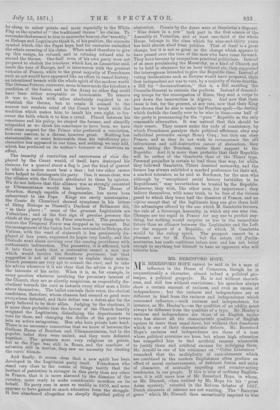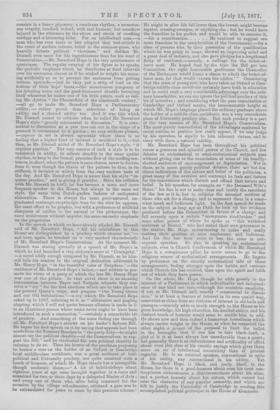MR. BERESFORD HOPE.
1/FR. BERESFORD HOPE cannot be said to be a man of _V I_ influence in the House of Commons, though he is unquestionably a character, almost indeed a political gro- tesque, a political gurgoyle. He is not without shrewd- ness, and still less without convictions ; his speeches always show a certain amount of raciness, and even an excess of independence ; but the raciness and independence are as different in kind from the raciness and independence which command influence,—such raciness and independence, for instance, as Mr. Henley's,—as the qualities of an oddity must always be different from the qualities of a type. Mr. Henley's raciness and independence are those of an English squire who has almost all the characteristic qualities of English squires in more than usual force, but without that dumbness which is one of their characteristic defects. Mr. Beresford IIope's raciness and independence are those of a man whose political aversions are keen, but whose high education has compelled him to find artificial reasons wherewith to justify them and artificial excuses for indulging them. Mr. Arnold in one of his criticisms on " Celtic Literature " remarked that the multiplicity of race-elements which are combined in the modern Englishman often produce an effect of moral embarrassment, of deficient fusion and unity of character, of mutually impeding and counter-acting tendencies, in our people. If this is true of ordinary English- men, it is still more true of Mr. Beresford Hope, in whom, as Mr. Disraeli, when twitted by Mr. Hope for his " great Asian mystery," retorted in the Reform debates of 1867, Dutch elements of manner are not wanting. The " Batavian grace" which Mr. Disraeli then sarcastically imputed to him
consists in a heavy piquancy, a cumbrous rhythm, a monoton- ous vivacity, touched, indeed, with real humour, but somehow injured in the utterance by the stress and strain of creaking cordage and a labouring helm. For an intellectual man,—a man who has even more or less adopted that test-article in the creed of modern culture, belief in the common-place, who heartily detests political " viewiness," and dislikes Mr. Disraeli even more for his ingeniousness than for his want of Conservatism,—Mr. Beresford Hope is the very quintessence of quaintness. The regular swaying of his figure as he speaks, the periodic emphasis which he distributes at fixed intervals over his sentences, almost as if he wished to weight his mean- ing artificially so as to prevent the sentences from getting bottom upwards,—just as they put a strip of lead on the bottom of little boys' boats,—the monotonous pungency of his debating voice, and the good-humoured chuckle betraying itself whenever he makes one of his little points, such as call- ing Mr. Ayrton " the Chesterfield of the nineteenth century," —all go to make Mr. Beresford Hope a Parliamentary oddity, — rather proud than otherwise of being an oddity, and a shrewd oddity too. And it was this which Mr. Disraeli meant to criticize when he called Mr. Beresford Hope's style " greatly ornamental to discussion." It is orna- mental to discussion as a yew tree cut out in the shape of a peacock is ornamental to a garden ; its very stiffness pleases, —caprice in art is always agreeable whore there is no feeling that a higher kind of interest is sacrificed to it,—but then, as Mr. Disraeli added of Mr. Beresford Hope's style, "it requires practice." The very essence of such a style is to be consistent in oddity, to adhere steadily to the same quaint rhythm, to keep to the formal, precisian flow of the scoffing sen- tences, in short, when the pattern is once chosen, never to deviate from it, even though the charm of the pattern be that, in its stiffness, it deviates so widely from the. easy modern taste of the day. And Mr. Beresford Hope is aware that his style "re- quires practice," and is giving it practice. Since his collision with Mr. Disraeli in 1867, he has become a more and more frequent speaker in the House, but always in the same set style, the same trim Dutch-garden fashion of antiquated elaboration. There is always the same good-natured, un- graduated contempt-on-principle tone for the view he opposes, the same effort to be graphic, but with a preference of artificial sharpness of outline to the natural or the picturesque, the same incisiveness without impulse, the same sarcastic emphasis on the proprieties.
In the speech to which we have already alluded Mr. Disraeli said of Mr. Beresford Hope, " All his exhibitions in this Houser are distinguished by a prudery which charms me,"— and here, again, he touched on a very marked characteristic of Mr. Beresford Hope's Conservatism. At the moment Mr, Disraeli was aiming specially at a speech of Mr. Hope's in which he had launched a very elaborate sneer at " Coningsby," —a novel oddly enough composed by Mr. Disraeli, as ho him- self tells his readers in the original dedication addressed to Mr. Henry Hope, " in the beautiful vales of Deepdene,"—the residence of Mr. Beresford Hope's father,—and written to pro- mote the views of a party of which the late Mr. Henry Hope was one of the pillars. In that novel there is an amusing conversation between Taper and Tadpole, wherein they con- trive a " cry " for the first elections which are to take place in the present Queen's reign, and propose " Our Young Queen and our Old Institutions,"—a cry which Mr. Beresford Hope raked up in 1807, referring to it as " alliterative and jingling claptrap, which I will not quote because allusion is made in it to an illustrious person whose name never ought to have been introduced in such a connection,"—certainly a remarkable bit of prudery. And something of the same feeling ran through all Mr. Beresford Hope's attacks on his leader's Reform Bill. He began his first speech on it by saying that appeals had been made from the Treasury Benches to " the party duty—ho might almost say the political chastity—of the Conservatives, to sup- port the Bill," and he vindicated his own political chastity in refusing to do so. Then his horror of the provision proposing to bestow a vote on the holder of an Oxford or Cambridge local middle-class certificate, was a great outburst of both political and University prudery, not quite unmixed with a touch of humour, of which Mr. Hope clearly has a perceptible though moderate share,—" A lot of hobbledehoys about eighteen years of age were brought together in a room and examined for two or three days by a delegated Master of Arts ; and every one of them who, after being crammed for the occasion by the village schoolmaster, obtained a pass was to be enfranchised for years to come by this precious scheme !
He might in after life fall lower than the lowest, might become• tapster, crossing-sweeper, or anything else ; but he would have the franchise in his pocket, and would be able to exercise it, —for a consideration He ventured to suggest one more franchise to the consideration of the Government,—for a class of persons who, by their possession of the qualification which he was going to name, showed an improving mind and a great deal of industry, and also gave pledges for a lengthened fixity of residence,—namely, a suffrage for the ticket-of- leave man. He hoped that by the time the Bill got into Committee, the right honourable gentleman the Chancellor of the Exchequer would frame a clause to admit the' ticket-of. leave man, for that would crown the edifice.' " Considering that the mass of young men who have taken an Oxford or Cam- bridge middle-class certificate certainly have both in education and in social rank a very considerablejadvantage over the ordi- nary householder, no one can ignore the political prudery of this bit of invective ; and considering what the pass examination at Cambridge and Oxford means, the immeasurable height at which Mr. Hope's language placed the ordinary graduate above the holder of a middle-class certificate, was a very remarkable piece of University prudery also. But such prudery is a part of the very essence of Mr. Beresford Hope's Conservatism. The most purely conventional of the advantages conferred by social custom or positive law really appear, if we may judge by his speeches, to signify to him inherent virtues, and to carry with them a natural validity.
Mr. Beresford Hope has been throughout his political career a generous and splendid patron of the Church, and few debates on ecclesiastical or semi-ecclesiastical subjects pass without giving rise to the enunciation of some of his heavily- shotted sentences of encouragement or depreciation. Yet in these, as in more purely political debates, there are but few direct indications of the nature and belief of the politician, a great many of the aversion and contempt he feels and fosters for the innovations which disturb and offend that nature and belief. In his speeches, for example, on " the Deceased Wife's Sister," his line is not to make clear and justify the sanctions of the law as it is, but to criticize the assumed motives of those who ask for a change, and to represent them in a some- what harsh and ludicrous light. In the first speech he made on the subject as long ago as IUD, he took up the evidence produced before the Committee in favour of a change, and fell severely upon a certain " anonymous stockbroker," and some other person of whom he spoke as " this wretched architect of Bristol," who had stated their own grievances in the matter, Mr. Hope endeavouring to make and really making their position at once unpleasant and ludicrous. And his line has been more or less the same in sub-
sequent speeches. So also, in speaking on ecclesiastical subjects, even in Church Conferences, of which Mr. Beresford Hope is a conspicuous pillar, he never seems to go to the religious source of ecclesiastical arrangements. He lingers by preference on the strictly ecclesiastical side of those arrangements, feeling stronger upon the habits and customs. which Church life has evolved, than upon the spirit and faith out of which they have grown.
On the whole, Mr. Hope, though he adds greatly to the interest of a Parliament in which individuality and indeponde ence of any kind are rare,—though his eccentric causticity, if not, as Mr. Disraeli said, exactly " ornamental to discus- sion," is at least a feature of interest in its own quaint way, somewhat as china lions are features of interest in old halls and passages,—scarcely adds as much strength to the House as his great knowledge, his high education, his decided ability, and his distinct touch of humour would seem to entitle him, to add. He shows now and then indeed a humorous homeliness which always carries weight in the House, as when he remarked the other night, a propos of the proposal to limit the ballot to the boroughs, that if one has to take black-draft, a pint of it is at least always less unendurable than a quart ; but generally there is an elaborateness and artificiality of effect about even this class of his caustic sayings which gives them more an air of intellectual eccentricity than of general sagacity. Ho is an external speaker, conventional in spite of his oddity, nay conventional in his oddity. Yet Mr. Beresford Hopo is liked, and justly liked, in the House, for there is a good-humour about even his most con. temptuous elaborateness, a disinterestedness about his aims, and a perfect honesty about his nature, which cannot but raise the character of any popular assembly, and which are felt to justify the University of Cambridge in sending this accomplished political grotesque to the House of Commons.































 Previous page
Previous page